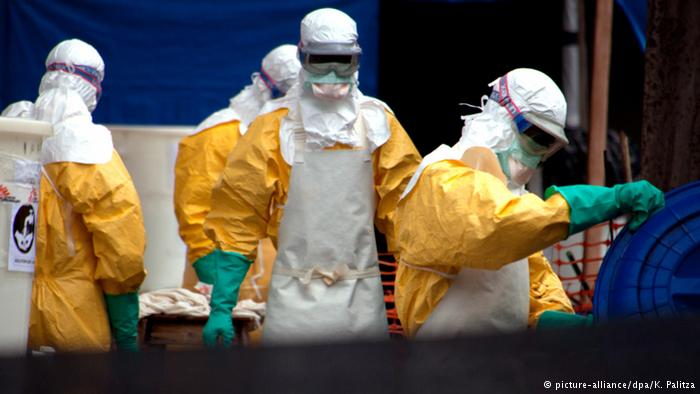In a bid to curb the spread of Ebola, Guinea’s President Alpha Conde has declared a 45-day “health emergency” in five regions of the epidemic-hit nation. The chances of an Ebola-free West Africa remain uncertain.
In a statement published in Guinea’s national media on Saturday, Conde said the virus “has shifted to our country’s coastal areas” in Guinea’s west and southwest.
“That is why I am declaring a reinforced health emergency for a period of 45 days in the prefectures of Forecariah, Coyah, Dubreka, Boffa and Kindia,” the president said.
Food and medical supplies would be given to the affected communities, Conde added. The president did not specify, however, where or when the restrictions would take effect.
Conde’s announcement on Saturday came as Guinea continues to struggle in its fight against the Ebola virus.
In January, the World Health Organization (WHO) declared that the epidemic was finally declining in West Africa after the three countries most affected – Sierre Leone, Liberia and Guinea – recorded a steady decrease in cases. In Guinea, however, efforts have often been hindered by violent resistance to health officials.
Also on Saturday, neighboring Liberia reported that a woman who became the country’s had died. Health officials also said two new suspected cases had been identified, halting the country’s plans to be Ebola-free by April.
WHO requires countries prove there are no new cases of Ebola reported for 42 days before it can be officially declared virus-free, because the incubation period is 21 days.
A day earlier, Sierra Leone began a new three-day nationwide lockdown sparked by fears that the virus was making a comeback in certain parts of the country.
Since the Ebola outbreak began in Guinea in December 2013, more than 24,000 people in nine countries have been infected with the virus, of which over 10,000 have died.
FRENCH VERSION
Ebola en Guinée
« C’est pourquoi je déclare une santé renforcée d’urgence pourune période de 45 jours dans les préfectures de Forécariah,Coyah, Dubreka, Boffa et Kindia, » a déclaré le Président.
Aliments et fournitures médicales disposeraient pour lescommunautés touchées, a ajouté Conde. Le Président ne précisepas, cependant, où et quand les restrictions entrerait en vigueur.
Annonce de Conde samedi a été comme la Guinée continue àlutter dans sa lutte contre le virus Ebola.
En janvier, l’Organisation mondiale de la santé (OMS) a déclaréque l’épidémie était en déclin enfin en Afrique de l’ouest aprèsque les trois pays les plus touchés – Sierre Leone, le Libéria etGuinée – a enregistré une diminution régulière des cas. EnGuinée, toutefois, des efforts ont souvent été entravées par larésistance violente aux responsables de la santé.
Également samedi, les voisins Libéria signalé qu’une femme quiest devenu du pays était morts. Responsables de la santé aajoutent que deux nouveaux suspects cas avaient été identifiés,enrayer les plans du pays comme indemne de virus Ebola en avril.
QUI a besoin de pays prouvent il n’y a qu’aucun nouveau cas devirus Ebola ne signalés pendant 42 jours, qu’il puisse êtreofficiellement déclaré exempt de virus, parce que la périoded’incubation est de 21 jours.
Un jour plus tôt, la Sierra Leone a commencé un nouveaulockdown dans tout le pays de trois jours déclenché par lescraintes que le virus était de retour dans certaines parties dupays.
Depuis le début de l’épidémie d’Ebola en Guinée en décembre2013, plus de 24 000 personnes dans neuf pays ont été infectéspar le virus, dont les plus 10 000 sont morts.



